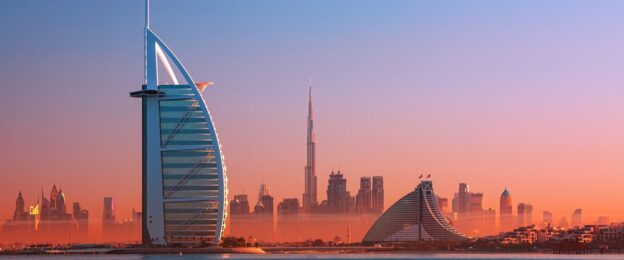(Bloomberg) — BlackRock Inc.’s Larry Fink was among headliners at Saudi Arabia’s annual Davos-style investment confab in October. Days later, he popped up on a social media post from Abu Dhabi’s $1.5 trillion man, Sheikh Tahnoon bin Zayed Al Nahyan.
The $11.5 trillion asset manager Fink runs recently received approval to set up its regional headquarters in Riyadh. It’s also teaming up with the Abu Dhabi royal on one of the largest efforts to date to bankroll the build-out of data warehouses and energy infrastructure.
The biggest firms on Wall Street operate across geographies and top executives often fly to multiple countries while visiting a region. But Riyadh and Abu Dhabi, which are competing to be the Middle East’s main business hub, offer unique opportunities: The cities control over $1 trillion in sovereign wealth each, making them among the biggest pools of capital in the world.
Sheikh Tahnoon — one of Abu Dhabi’s two deputy rulers, the United Arab Emirates’ national security adviser and brother to its president — had conversations with many executives who also spoke at the FII, according to posts on the royal’s X profile.
That list included Morgan Stanley Chief Executive Officer Ted Pick, Blackstone Inc.’s Steve Schwarzman and Ruth Porat of Alphabet Inc., which is partnering with Saudi Arabia on an artificial intelligence hub. Meanwhile, Goldman Sachs Group Inc. CEO David Solomon also dropped by in Abu Dhabi shortly after his firm announced its new Riyadh office, according to a person familiar with the matter.
The two cities have rolled out a series of initiatives in their quest for greater global relevance. Riyadh is asking international firms to boost their local presence, or risk losing business. That’s prompted the likes of General Atlantic and Goldman to beef up their operations in the kingdom.
Some others have been reluctant about making Riyadh their main hub because their employees prefer the lifestyle in the UAE. To further sweeten the deal, Abu Dhabi has also rolled out a series of perks, including a lifestyle-support program for incoming financiers.
But many firms looking to raise cash or plug into dealmaking driven by ambitious diversification programs are trying to keep a foot in both camps.
BlackRock, for instance, said its new Riyadh base will help the firm expand operations across the Middle East and not just in the kingdom. Goldman continues to have a significant presence in both Dubai and Abu Dhabi, and Barclays Plc, which is considering re-entering Saudi Arabia after a decade, said it intends to grow its team in the UAE as well.
Meanwhile, investment bank Lazard Inc., which held sale talks with Abu Dhabi fund ADQ last year, is making a big push in Saudi Arabia, Bloomberg News has reported.
While both cities have embarked on similar drives to lure the world’s biggest firms, the past couple of years have also brought into sharp relief shifting priorities for officials in Riyadh and Abu Dhabi, and the kinds of partnerships they’re seeking.
For instance, Saudi Arabia, with its large and relatively young population, is prioritizing projects aimed at developing its infrastructure, which significantly lags the UAE.
But with finances constrained as a result of weak oil prices, it needs to bring in more foreign capital – hence the desire to get the world’s biggest infrastructure fund managers into the country. Case in point: Brookfield Asset Management Ltd.’s new $2 billion Middle East vehicle.
“People used to come to us and ask for money,” Yasir Al Rumayyan, the governor of the kingdom’s nearly $1 trillion Public Investment Fund, said on a panel at the FII last month. “We are now seeing a shift from people wanting to take our money to people wanting to co-invest.”
Saudi Arabia is also becoming a regional opportunity for investment banks. The kingdom is in the midst of a vast privatization program to raise cash to fund investment plans, and that’s transformed Riyadh into a hotspot for initial public offerings.
For Abu Dhabi, with energy riches outweighing the ability of the local economy to digest and which already boasts some of the best infrastructure in the region, the focus is using those assets to prepare for the post-oil economy.
Abu Dhabi Investment Authority, the emirate’s $1 trillion wealth fund continues to invest predominantly outside the country. At the same time, the city has drawn some of the world’s biggest hedge funds.
That’s prompted officials to start expanding the financial hub’s jurisdiction to a neighboring island, in a move that will give it 10 times as much space. Months after billionaire Alan Howard said Abu Dhabi could become a global financial center, Bloomberg News reported the hedge fund he set up manages more money from the emirate than anywhere else.
Get the Mideast Money newsletter, a weekly look at the intersection of wealth and power in the region.
But here too, there’s a balancing act.
Bridgewater Associates founder Ray Dalio, the face of Abu Dhabi’s push to draw hedge fund luminaries, was in Riyadh for FII. He was spotted in traditional Arab garb ahead of the event and later, on a panel, explained the reasons behind his ties to the region.
The billionaire was effusive in his praise of Saudi Crown Prince Mohammed bin Salman. “I think his Royal Highness is a great leader,” he said. “He’s almost like a Deng Xiaoping of China, in a sense, or a Lee Kuan Yew (of Singapore).”
–With assistance from Silla Brush, Mark Bergen, Laura Gardner Cuesta, Ben Scent and Siddharth Philip.
©2024 Bloomberg L.P.
https://www.bnnbloomberg.ca/business/company-news/2024/11/10/wall-street-giants-split-time-between-trillion-dollar-gulf-hubs/





